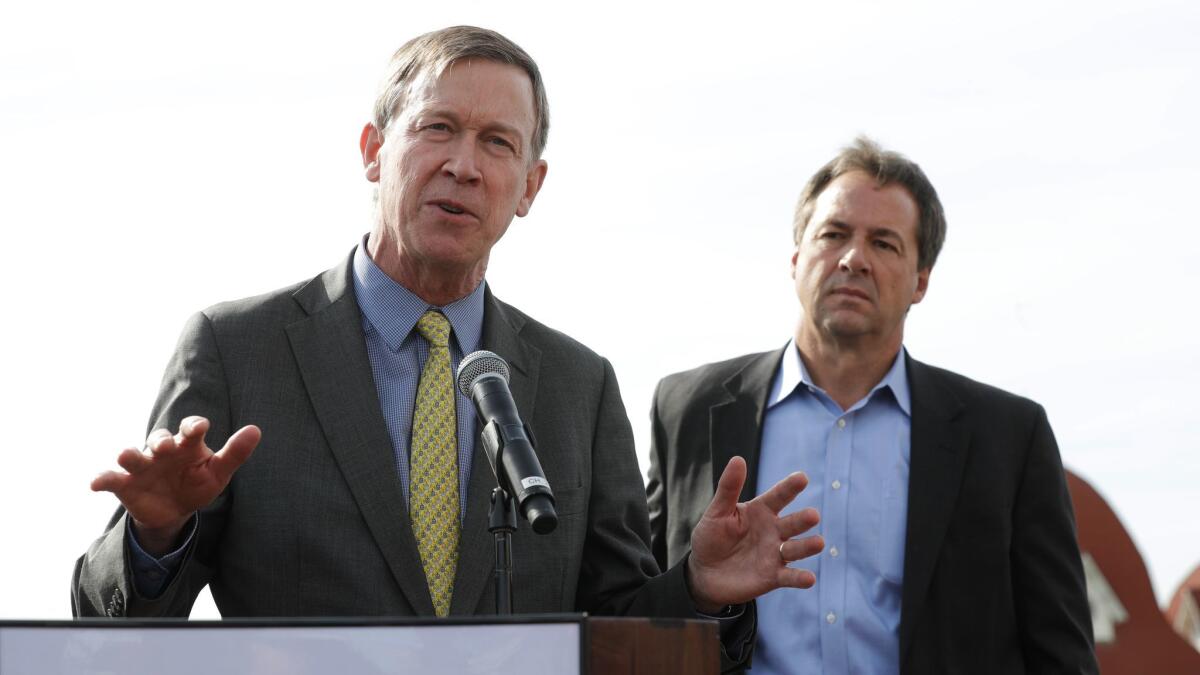Governors of California and other Western states uncertain about life under a Trump administration

- Share via
Reporting from Coronado, Calif. — Governors on both sides of the political divide expressed uncertainty on Tuesday about what lies ahead under President-elect Donald Trump, whose stances on issues from immigration to healthcare have shifted over the last year.
“What positions is he going to take back? What things did he say he’s going to roll back on and what things is he going to push forward? That uncertainty, I think, causes anxiety,” said Colorado Gov. John Hickenlooper as he walked the manicured grounds of the spacious Hotel del Coronado, where the Western Governors’ Assn. opened its winter meeting.
New Mexico Gov. Susana Martinez, a Republican whom Trump mocked during the campaign as an ineffective leader for her state, said when it came to immigration she would like the administration to seek advice from the states. “We should make agreements together because we know our states the best,” Martinez said.
In interviews, many of the nine governors in attendance expressed their uneasiness about the unpredictability of the incoming administration. Many insisted that states’ rights must be upheld and, in a symbolic gesture, issued a resolution noting that “state authority should be presumed sovereign.”
But with little more than a month until Trump is sworn in, Hickenlooper, a Democrat, is trying to remain optimistic that some of his state’s more progressive efforts on, among other things, clean energy, will remain intact with the new administration.
Wyoming Gov. Matt Mead, a Republican whose state is a leader in energy production, was cautiously optimistic that a Trump administration would help on energy projects.
“We certainly hope with the new administration there is a better opportunity to develop not only oil and gas, but energy projects in general,” he said. “What we need is more certainty in the regulatory process and to be able to do it in a more timely basis. This isn’t only important for oil and gas … the new administration I hope will provide a permitting process for energy whether it’s renewable or fossil fuels that provides more certainty at a less expense that we can get it done in a more timely fashion.”
Some Republican governors were hopeful that Trump would be more receptive to input from the states about what to do with federal land. Gov. Gary Herbert of Utah, where the federal government owns about 60% of the land, said Washington must heed more local input as to what should be done with federal land — specifically as it pertains to oil and gas drilling.
During the campaign, Trump expressed support for lifting moratoriums on energy production in federal areas that are both onshore and offshore.
“We’re going to try and work with the new administration to find a balance point,” Herbert said of new drilling in the state. “Some land will be developed … but some will be put off-limits, because it’s not wise and prudent to develop in some of those iconic areas.”
Idaho Gov. Butch Otter, a Republican who served as Trump’s honorary campaign chairman in the deeply conservative state, said he was optimistic the new administration would have a more collaborative approach about federal land — unlike, he says, the Obama administration.
“He’s said we ought to be drilling for gas, we ought to be grazing cattle,” Otter said, noting that he would be willing to be a “sharecropper for the public lands of Idaho.”
“We’ve suffered through some administrations where no activity is preferred to any activity, and that’s just not right,” he said.
On Tuesday, ahead of the governors’ meeting, California Gov. Jerry Brown penned an open letter to the Obama administration, urging it to make permanent the existing ban on new oil and gas drilling along the California coast. Democrats and environmentalists lauded the move ahead of Trump entering the White House, and Brown echoed those sentiments in remarks to reporters at the meeting.
“California has opposed offshore drilling since back into the Ford administration — a long time,” he said.
Trump has said he will repeal and replace the Affordable Care Act, but Democrats in Washington and nationwide fear the ramifications of millions of people losing healthcare coverage. Brown, along with Hickenlooper and Gov. Steve Bullock of Montana, a Democrat who last month won reelection in a state Trump carried by about 20 percentage points, vowed to stand up to any repeal efforts.
“In California, we’re going to fight to defend our rights and the well-being of our citizens,” Brown said.
Of the governors in attendance on Tuesday, only Brown and Hickenlooper represented states where voters had approved measures legalizing marijuana for recreational use.
Trump has said legal marijuana is a states’ rights issue, but his pick to lead the Justice Department, Sen. Jeff Sessions of Alabama, has strongly opposed legal weed. He characterizes it as a “real danger,” which has caused anxiety among supporters of legal marijuana nationwide.
Hickenlooper said he would have liked to see the federal government have more influence back in 2012, when Colorado legalized recreational marijuana, but now that more states are passing similar laws, the federal government should allow the process to continue. He said he didn’t expect things to change significantly on that front.
For more political news follow @kurtisalee
More to Read
Get the L.A. Times Politics newsletter
Deeply reported insights into legislation, politics and policy from Sacramento, Washington and beyond. In your inbox twice per week.
You may occasionally receive promotional content from the Los Angeles Times.









